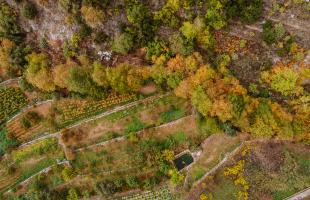A true mosaic of nature and culture
Part of UNESCO Network of Biosphere Reserves since 2009
Jabal Moussa Biosphere Reserve (JMBR) is located in Lebanon, on the shoulders of the western slopes of Mount Lebanon Chain, overlooking the Mediterranean Sea to the West.
It is located in the Kesrouan-Jbeil area, 50 km away from the capital Beirut and 25km from Byblos. Bounded by the historical Nahr Ibrahim and Nahr Ed-Dahab rivers, the core area of Jabal Moussa covers an area of 1,250 ha in Mount Lebanon at an altitude ranging between 350m and 1700m.
Jabal Moussa and surrounding villages became part of the UNESCO Network of Biosphere Reserves under the Man and Biosphere (MAB) program in 2009. As part of the MAB program, JMBR addresses human livelihood improvement and nature conservation through combining natural sciences with social sciences, economics and education.
Jabal Moussa mountain presents an exceptionally rich biodiversity, with at least 728 flora species, 25 mammal species, and more than 137 migratory and soaring birds species. Rare and threatened mammals have found shelter in the rugged mountain, ranging from bats to wolves and hyenas, adding to more than 20 species.
It is designated as an IPA (Important Plant Area) for its significant floral diversity and pronounced endemism, with several endemic species such as the Salvia peyronii, Cyclamen libanoticum, Erica sicula subsp. libanotica, and Alkanna leiocarpa, which gives the site a unique value. The mountain presents geological particularities, and was described as being at the center of the formation of the mountains of Mount Lebanon, featuring the oldest outcrops in Lebanon.
Equally rich with cultural heritage Jabal Moussa portrays the interdependence of man and nature throughout history through various spiritual and historical sites dating all the way back to Prehistory, with ruins from the Phoenician, Roman, Medieval and Ottoman periods found in mountain.
From the various landscape surveys conducted, it was demonstrated that it is not only a sequence of natural incidents that brought forth the natural wealth of the mountain; Jabal Moussa is an example of a very long human-nature interaction that allowed to shape this seemingly wild nature.
Renowned for being the birth site of the Phoenician myth of Adonis and Astarte, the adjacent Adonis Valley provides the region with unique cultural, archaeological and natural values. According to R. Haber and M. Semaan-Haber, the valley is one of the least disturbed valleys in Lebanon, making the ecological, geological and cultural systems extremely well preserved.
In 1861, the French historian Ernest Renan described the valley as “the most remarkable” area in Lebanon, and the summits of Jabal Moussa as the “wildest” point in the country.
Despite their importance, cultural sites in Jabal Moussa and Adonis Valley are still widely unexplored.
Jabal Moussa is surrounded by 7 main villages where agriculture and related activities ensure income for small-scale farmers and their families such as charcoal production, animal husbandry, beekeeping, shepherds grazing and small-scale agriculture. Local communities are highly influenced by religious and cultural traditions. Festivities and pilgrimage are carried out annually all over the villages, to celebrate various religious events.
Visiting Jabal Moussa can vary from hiking in one day to spending 5 days in between the mountain and surrounding villages, discovering landscapes, learning about the local community’s traditions and culture, visiting archaeological sites and tasting local food.


